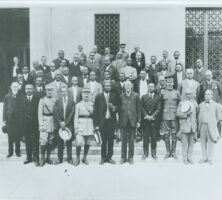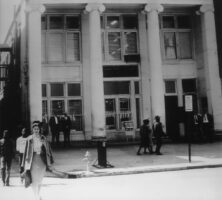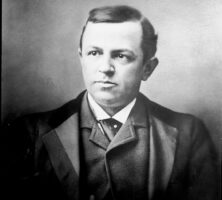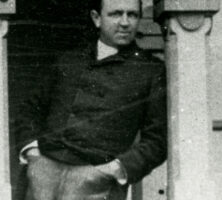The New Georgia Encyclopedia is supported by funding from A More Perfect Union, a special initiative of the National Endowment for the Humanities.
Robert S. Abbott, a Georgia native, was a prominent journalist who founded the Chicago Defender in 1905. He is pictured (second row, fifth from right) in June 1918 at a meeting of Black leaders in Washington, D.C. Prominent historian and educator W. E. B. Du Bois stands in the first row, fourth from the right.
Courtesy of Special Collections and University Archives, University of Massachusetts Amherst Libraries
The New Georgia Encyclopedia does not hold the copyright for this media resource and can neither grant nor deny permission to republish or reproduce the image online or in print. All requests for permission to publish or reproduce the resource must be submitted to the rights holder.
A newsboy sells copies in April 1942 of the Chicago Defender, a leading Black newspaper founded in 1905 by Georgia native Robert S. Abbott. The publication covered events and issues in Chicago's Black community, but also reported on racial news from the South and encouraged southern Blacks to move north after World War I.
Courtesy of Library of Congress, Prints and Photographs Division
The New Georgia Encyclopedia does not hold the copyright for this media resource and can neither grant nor deny permission to republish or reproduce the image online or in print. All requests for permission to publish or reproduce the resource must be submitted to the rights holder.
The Georgia Historical Society erected a historical marker at the site of newspaper editor Robert S. Abbott's childhood home in Savannah on August 26, 2008. In 1905 Abbott founded the Chicago Defender, which quickly became one of the most important Black newspapers in the first half of the twentieth century.
Courtesy of Georgia Historical Society, Historical Marker Program.
The New Georgia Encyclopedia does not hold the copyright for this media resource and can neither grant nor deny permission to republish or reproduce the image online or in print. All requests for permission to publish or reproduce the resource must be submitted to Georgia Historical Society.
John H. Sengstacke (right), a Savannah native and nephew of Robert S. Abbott, assumed management of the Chicago Defender in 1940 upon the death of Abbott, who founded the newspaper in 1905. Sengstacke is pictured in March 1942 at the Defender's office in Chicago.
Courtesy of Library of Congress, Prints and Photographs Division, Farm Security Administration - Office of War Information Photograph Collection, #LC-USW3-000802-D.
The New Georgia Encyclopedia does not hold the copyright for this media resource and can neither grant nor deny permission to republish or reproduce the image online or in print. All requests for permission to publish or reproduce the resource must be submitted to the rights holder.
A portrait of journalist Clark Howell who served as a bridge from Georgia to the rest of the nation in matters political and journalistic.
Georgia Historical Quarterly
The New Georgia Encyclopedia does not hold the copyright for this media resource and can neither grant nor deny permission to republish or reproduce the image online or in print. All requests for permission to publish or reproduce the resource must be submitted to the rights holder.
The New Georgia Encyclopedia does not hold the copyright for this media resource and can neither grant nor deny permission to republish or reproduce the image online or in print. All requests for permission to publish or reproduce the resource must be submitted to the rights holder.
Ambrose Wright, a native of Jefferson County, served as a general in the Confederate army during the Civil War. In 1866 he became part owner and editor of the Augusta Chronicle and Sentinel newspaper, which he used to protest radical Republican policies during Reconstruction.
Courtesy of Library of Congress, Prints and Photographs Division
The New Georgia Encyclopedia does not hold the copyright for this media resource and can neither grant nor deny permission to republish or reproduce the image online or in print. All requests for permission to publish or reproduce the resource must be submitted to the rights holder.
Journalist Millard Grimes, a Georgia native, wrote for a number of publications in the state, including the Athens Daily News, the Columbus Ledger, and the Red and Black, the student newspaper at the University of Georgia. Grimes also twice owned the business magazine Georgia Trend, which he sold for the second time in 1999.
Courtesy of Hargrett Rare Book and Manuscript Library, University of Georgia Libraries, Georgia Photo File.
The New Georgia Encyclopedia does not hold the copyright for this media resource and can neither grant nor deny permission to republish or reproduce the image online or in print. Requests for permission to publish or reproduce the resource should be submitted to the Hargrett Manuscript and Rare Book Library at the University of Georgia.
Journalist Lucian Lamar Knight worked as a literary editor for the Atlanta Constitution and as an associate editor for the Atlanta Georgian before becoming the founder and first director of the Georgia Department of Archives and History (later Georgia Archives).
Courtesy of Georgia Archives,
Ad Hoc Collection, #
ah00134.
The New Georgia Encyclopedia does not hold the copyright for this media resource and can neither grant nor deny permission to republish or reproduce the image online or in print. Requests for permission to publish or reproduce the resource should be submitted to the Georgia Archives.
James McMahon Cox Jr., pictured in 1973, inherited control of Cox Enterprises in 1957, upon the death of his father, James Middleton Cox. Under his leadership, the company acquired its first cable television station in 1962 and also entered into the publishing, film, and automobile auction industries.
Courtesy of Atlanta Journal-Constitution.
The New Georgia Encyclopedia does not hold the copyright for this media resource and can neither grant nor deny permission to republish or reproduce the image online or in print. All requests for permission to publish or reproduce the resource must be submitted to the Atlanta Journal-Constitution.
James Middleton Cox is pictured at his desk in 1920, during his third term as the governor of Ohio. Although Cox never lived in Georgia, his 1939 purchase of the Atlanta Journal and the Atlanta Georgian gave him significant political power in the state. Cox also acquired WSB, the South's first radio station, in the deal.
Courtesy of Library of Congress, Prints and Photographs Division
The New Georgia Encyclopedia does not hold the copyright for this media resource and can neither grant nor deny permission to republish or reproduce the image online or in print. All requests for permission to publish or reproduce the resource must be submitted to the rights holder.
James M. Cox (left), the governor of Ohio and founder of Cox Enterprises, is pictured at the White House with Franklin D. Roosevelt in 1920. That year Roosevelt, who was elected president of the United States in 1932, ran as Cox's vice presidential candidate during Cox's unsuccessful bid for the presidency.
Courtesy of Library of Congress, Prints and Photographs Division
The New Georgia Encyclopedia does not hold the copyright for this media resource and can neither grant nor deny permission to republish or reproduce the image online or in print. All requests for permission to publish or reproduce the resource must be submitted to the rights holder.
An employee of Cox Communications, a subsidiary of Cox Enterprises, installs telecommunications wire. The nation's third-largest cable company in 2006, Cox Communications offers multiservice broadband communications to 6.7 million customers around the nation.
Courtesy of Cox Communications
The New Georgia Encyclopedia does not hold the copyright for this media resource and can neither grant nor deny permission to republish or reproduce the image online or in print. All requests for permission to publish or reproduce the resource must be submitted to the rights holder.
Anne Cox Chambers accepts the Human Relations Award in 1984 from U.S. president Jimmy Carter. Chambers received the award during the annual banquet of the Institute of Human Relations of the American Jewish Committee.
Courtesy of Atlanta Journal-Constitution.
The New Georgia Encyclopedia does not hold the copyright for this media resource and can neither grant nor deny permission to republish or reproduce the image online or in print. All requests for permission to publish or reproduce the resource must be submitted to the Atlanta Journal-Constitution.
Emily Woodward, the prominent Georgia journalist. Woodward edited the weekly Vienna News from 1916 until 1933. She later devoted much of her time to advocating for adult education.
Image from Progressive Georgians (1937) by Dudley Glass
The New Georgia Encyclopedia does not hold the copyright for this media resource and can neither grant nor deny permission to republish or reproduce the image online or in print. All requests for permission to publish or reproduce the resource must be submitted to the rights holder.
Turnwold Plantation in Eatonton was the home of Joseph Addison Turner, who published a Confederate newspaper called The Countryman during the Civil War. It is also the setting of On the Plantation, a fictionalized account by Joel Chandler Harris of his experiences as a young typesetter at Turnwold.
Courtesy of Georgia Archives, Vanishing Georgia, #
put168.
The New Georgia Encyclopedia does not hold the copyright for this media resource and can neither grant nor deny permission to republish or reproduce the image online or in print. Requests for permission to publish or reproduce the resource should be submitted to the Georgia Archives.
Joseph Addison Turner, a native of Putnam County, published a weekly Confederate newspaper during the Civil War. Entitled The Countryman, the paper was published from Turner's plantation and launched the writing career of fellow Georgian Joel Chandler Harris.
The New Georgia Encyclopedia does not hold the copyright for this media resource and can neither grant nor deny permission to republish or reproduce the image online or in print. For more information about this resource, contact the Stuart A. Rose Manuscript, Archives, and Rare Book Library at Emory University.
Publisher and philanthropist Peyton Anderson poses in the Macon Telegraph pressroom in the late 1950s or early 1960s. Anderson assumed control of the Telegraph from 1951 until 1969.
Courtesy Peyton Anderson Foundation
The New Georgia Encyclopedia does not hold the copyright for this media resource and can neither grant nor deny permission to republish or reproduce the image online or in print. All requests for permission to publish or reproduce the resource must be submitted to the rights holder.
The Macon Telegraph was housed in this building, pictured in the early 1950s, during the editorship of Peyton Anderson Jr.
Courtesy of Peyton Anderson Foundation
The New Georgia Encyclopedia does not hold the copyright for this media resource and can neither grant nor deny permission to republish or reproduce the image online or in print. All requests for permission to publish or reproduce the resource must be submitted to the rights holder.
Ralph McGill was a long-time editor and publisher of the Atlanta Constitution. Through his daily newspaper columns, McGill advocated racial and ethnic tolerance.
Courtesy of Atlanta Journal-Constitution.
The New Georgia Encyclopedia does not hold the copyright for this media resource and can neither grant nor deny permission to republish or reproduce the image online or in print. All requests for permission to publish or reproduce the resource must be submitted to the Atlanta Journal-Constitution.
Journalist Ralph McGill won the Pulitzer Prize for editorial writing in 1959. As editor and publisher of the Atlanta Constitution, McGill broke the code of silence on the subject of segregation.
Courtesy of Atlanta Journal-Constitution.
The New Georgia Encyclopedia does not hold the copyright for this media resource and can neither grant nor deny permission to republish or reproduce the image online or in print. All requests for permission to publish or reproduce the resource must be submitted to the Atlanta Journal-Constitution.
Ralph McGill, a native Tennessean, began working for the Atlanta Constitution as an assistant sports editor in 1929. He became editor of the newspaper in 1942 and publisher in 1960, holding that position until his death in 1969. Through his daily columns McGill became a leading voice in the civil rights movement, and in 1959 he won the Pulitzer Prize in editorial writing.
Courtesy of Atlanta Journal-Constitution.
The New Georgia Encyclopedia does not hold the copyright for this media resource and can neither grant nor deny permission to republish or reproduce the image online or in print. All requests for permission to publish or reproduce the resource must be submitted to the Atlanta Journal-Constitution.
Atlantan Henry Grady, a prominent orator and editor of the Atlanta Constitution, heralded the coming of the New South after the end of the Civil War.
Courtesy of Special Collections & Archives, Georgia State University Library, Lane Brothers Commercial Photographers Photographic Collection.
The New Georgia Encyclopedia does not hold the copyright for this media resource and can neither grant nor deny permission to republish or reproduce the image online or in print. Requests for permission to publish or reproduce the resource should be submitted to Special Collections and Archives at Georgia State University.
Between 1880 and 1886 the Atlanta Constitution became the primary instrument of the Atlanta Ring, a loosely connected group of urban, proindustry Democrats. Henry Grady became the group's leader and dominant political force, helping to arrange the legislature's election of a fellow Ring member, Joseph E. Brown, to the U.S. Senate in 1880.
Courtesy of Stuart A. Rose Manuscript, Archives, and Rare Book Library, Emory University, Henry Woodfin Grady Papers.
The New Georgia Encyclopedia does not hold the copyright for this media resource and can neither grant nor deny permission to republish or reproduce the image online or in print. For more information about this resource, contact the Stuart A. Rose Manuscript, Archives, and Rare Book Library at Emory University.
With his New South platform, Henry W. Grady advocated unity and trust between the North and South and helped to spur northern investment in Atlanta industries.
Courtesy of Stuart A. Rose Manuscript, Archives, and Rare Book Library, Emory University, Henry Woodfin Grady Papers.
The New Georgia Encyclopedia does not hold the copyright for this media resource and can neither grant nor deny permission to republish or reproduce the image online or in print. For more information about this resource, contact the Stuart A. Rose Manuscript, Archives, and Rare Book Library at Emory University.



































